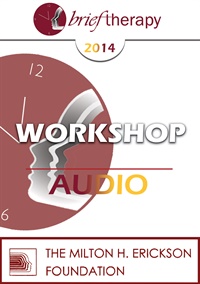BT14 Workshop 15 - Mindfulness and Intimacy: For Partners, Parents and Therapists - Ronald Siegel, PsyD
- Average Rating:
- Not yet rated
- Topic Areas:
- Workshops | Mindfulness | Intimacy | Couples Therapy | Relationships
- Categories:
- Brief Therapy Conference | Brief Therapy Conference 2014
- Faculty:
- Ronald Siegel, PsyD
- Duration:
- 1:54:20
- Format:
- Audio Only
- Original Program Date:
- Dec 12, 2014
- License:
- Never Expires.
Description
Description:
Psychotherapists and clinical researchers are finding that ancient Eastern meditative techniques, originally solitary practices refined by hermits, monks, and nuns, are proving to be remarkably useful for facing interpersonal challenges. This workshop will explore how mindfulness meditation can help our clients and us develop the affect tolerance and capacity to be with and understand others that are critical for successful intimate relationships. You’ll leave knowing the three core elements of mindfulness practice, how to use mindfulness to react less personally to the inevitable ups and downs of interpersonal life, and how interpersonal mindfulness techniques can enhance therapeutic, romantic, and parent-child interaction.
Educational Objectives:
- Describe how mindfulness practices change our view of self and others.
- Describe the role of a constructed self in relational difficulties.
- Identify 3 objects of awareness to attend to in applying mindfulness in intimate relationships.
*Sessions may be edited for content and to preserve confidentiality*
Credits
Faculty

Ronald Siegel, PsyD Related Seminars and Products
Ronald D. Siegel, PsyD, is Assistant Professor of Psychology, part time at Harvard Medical School, where he has taught for over 30 years. He is a long-time student of mindfulness meditation and serves on the board of directors and faculty of the Institute for Meditation and Psychotherapy.
Dr. Siegel teaches internationally about mindfulness and psychotherapy and mind–body treatment, has worked for many years in community mental health with inner-city children and families, and maintains a private practice in Lincoln, Massachusetts. He is the coauthor of Back Sense: A Revolutionary Approach to Halting the Cycle of Chronic Back Pain, which integrates Western and Eastern approaches for treating chronic back pain, coeditor of the acclaimed books for professionals, Mindfulness and Psychotherapy and Wisdom and Compassion in Psychotherapy: Deepening Mindfulness in Clinical Practice, and coauthor of the new professional text, Sitting Together: Essential Skills for Mindfulness-based Psychotherapy.


